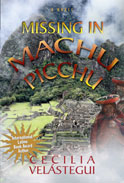"Her great-grandchildren often scolded her for openly talking about the ancient ways: the old beliefs in huacas, the sacred places and objects so revered by their ancestors... She felt sorry for them. Not only had they lost respect, they were forgetting the ancient ways."

 |
Missing in Machu Picchu by Cecilia Velastegui y Libros Publishing
book review by Wendy Strain
Although on the longer end of the spectrum for a novel, Missing in Machu Picchu is a highly engaging story from the start. Velastegui skillfully blends multiple disparate elements of the world together to create a tale that mimics, at its core, the fundamental sentiment of the Andean cultural beliefs, "the Andean rule of duality: darkness and light, love and hate, life and death."
The most obvious case for this blending occurs immediately as the old world of the Incas in the form of two old women, who ply their traditional wares in the Cusco marketplace, mingles with the flashy new world of modern technology and first world priorities. This new world is personified by a group of assumed wealthy American tourists undertaking a rigorous hike to Machu Picchu. The purpose of the hike is to rid themselves of their unhealthy online dating obsession. The ironic twist to their trek is that the trip is arranged completely online, relying on a handsome, charming half-Andean man whose past is largely a mystery held close by the people of the mountains.
The twists and turns of the plot are as intriguing as the beautiful descriptions of the Incan trails the women follow while they make their way up to the legendary ancient city. At times, the reader feels breathless with the splendors of the trail while, at other times, breathlessness is caused by the situation in which the characters find themselves. As the modern women make their way further from the civilization they know, the Andean women become stronger in their traditional ways of knowing. Whether this knowledge will come soon enough to save those most in need of saving is an answer saved until nearly the end of the novel.
Skillfully written with a high sensitivity for the values and beliefs of the ancient world as well as a strong awareness of many of the pitfalls of modern life, Velastegui delivers a thought-provoking story that questions our true values and their merit. While each woman is in control of her own future, few of them recognize the role they play in achieving her situation. The mountains provide them with the opportunity they seek to find transformation from the harsh realities they've left behind, but will they be strong enough and astute enough to make the change?
Not only does Velastegui write with high sensitivity and awareness of the Andean traditions, she includes details of these traditions within the narrative. At times, these descriptions are a bit indelicate as they are wedged unnaturally into the dialogue between two characters who have no need to describe such details to each other. However, they are interesting details of the rituals and symbolism of the region and thus appreciated by an audience seeking such factual information. The text is also graced with drawings and photographs that help illustrate the historical elements of the tale and linking it more fully with potential reality in the mind of the reader.
Finally, Velastegui ends the novel with beneficial end matter including an afterword that describes her inspiration for the story, a glossary to assist with difficult or unfamiliar words, a series of discussion questions capable of keeping a discussion group busy for a month or more, and a bibliography for those interested in discovering more detail about the concepts raised within the story.
RECOMMENDED by the US Review